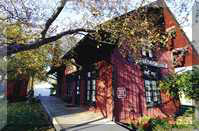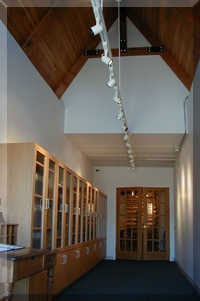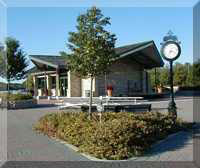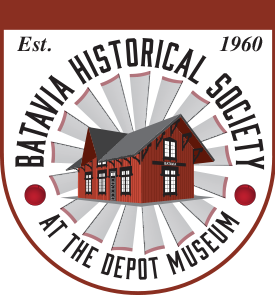
Depot Museum

Research Center

Bond Center
One perk of membership in the Batavia Historical Society is our fantastic newsletter that gets delivered directly to our member’s mailboxes. These newsletters contain information about upcoming Historical Society evens, historical research, information about collections and a favorite, our member’s own reminisces.
Past issues, form the Historical Society’s founding in 1960 to 2016, are a wealth of information as well. They are available and searchable on the website the Historical Society shares with the Batavia Public Library – Bataviahistory.org
If you have a great story or suggestion for our newsletter, please contact the Historian’s editor at [email protected].
Sample article, originally published in The Batavia Historian, the newsletter of the Batavia Historical Society
A century ago, Batavia was a thriving industrial town, third in size only to Elgin and Aurora in Kane County, and a Republican stronghold. In October, there was a huge political demonstration in downtown Batavia sponsored by the Swedish-American Republicans from Batavia, Aurora, and Geneva. The rally included bands and a torch-light parade and helped elect Frank E. George, a successful Batavia grocer as County Recorder and William McKinley, President of the U. S. Of the 1,110 local votes cast in November, McKinley received 856 votes, and the democrat William Jennings Bryan, 203.
Public utilities were coming into their own. Telephone companies were begging the city to let them run poles and lines to furnish service to the city. Citizens applied to the city for electric lights in their residences. Piped water was new. The U.S.W.E. & P. Co. applied to the city for water to supply their boilers and for drinking purposes in its factory. M. M. Kinne & Co. wanted water for basin purposes in its store. Firemen asked the city to have water run to their residences free of charge while they were employed by the city. Aldermen felt a need to extend the water mains. A fire hydrant was placed at Main and Lincoln Streets. Home owners along the north side of Houston Street petitioned the city for concrete sidewalks from Lincoln to Jackson Street. The other side wanted its walk to reach Harrison Street.
The finest drinking fountains in Kane County for livestock and people were placed on Batavia Avenue. They supplied drinkers with pure, cool water from the rocks 1,300 feet below. The fountains cost $100. The money came from cash that had been raised several years earlier for a 4th of July celebration that never took place.
Some new businesses opened during 1896.
- P. G. Pearson had a very fine greenhouse with 6,000 feet of ground under cultivation or glass opposite the West Side Cemetery.
- W. O. Jones opened a hardware business in the Walt Block.Fred Ries opened a manufactory to make sun bonnets and aprons, employing 100 women to sew the garments-many of which went to Chicago for sale.
- The Aurora, Batavia and Geneva Electric Street Railway was opened October 24. The half-hour ride between Aurora and Batavia was considered one of the prettiest in the state, running along the Fox River. The fare was 10 cents. The ride ran each hour. In Batavia the cars ended near the old Revere House on South Batavia Avenue, but they would soon run to Geneva as the railway company had permission to lay tracks to the north edge of Batavia.
Nine students graduated from East Batavia High School and five from West Batavia High School.
A year-long debate concerned whether city saloons should remain open. In December, the No-license supporters won. The council refused to renew the licenses of the city’s 6 saloons. Arguments for keeping them open were that they put $6,000 into the city treasury in license fees and an additional $500 for electricity and water. This was a serious loss to the city coffers and might not bring about the morality and sobriety that the No-license people hoped. It would vacate 6 store buildings and throw 20 people out of employment. It would cripple business and drive it to neighboring cities that still had licensed saloons.

